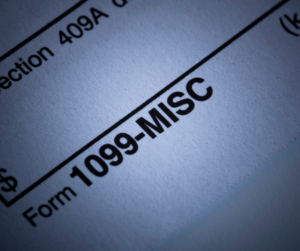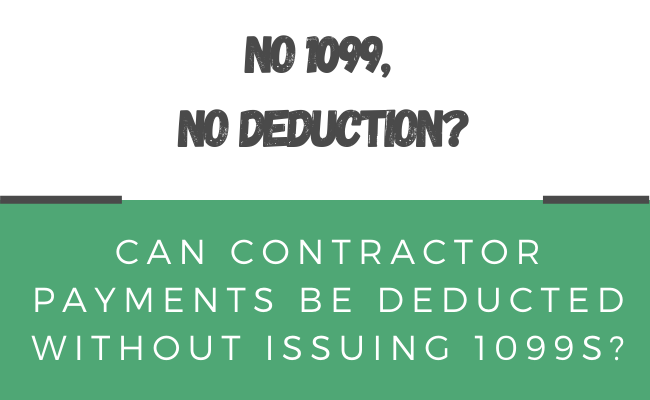No 1099, No Deductions?
This is something we have been asked recently, especially with Tax season upon us.
Question: I didn’t issue Form 1099s to my contractors in 2020. The IRS is auditing my 2020 Schedule C, and the auditor said I can’t deduct the contractor payments because I didn’t issue Form 1099s. Is this correct?
Answer: IRS auditors often make this claim, but they are incorrect. (Tricky Tricky IRS)
Deduction
Compensation for services rendered to your business is a deductible business expense, provided that your expenses are ordinary, necessary, and reasonable in amount.
There is no provision in the tax law that denies you a deduction for labor expenses simply because you didn’t file the required Form 1099s.
But the tax court has stated that the non-filing of required Form 1099s can cast doubt on the legitimacy of the deduction claimed.
In other words, don’t borrow trouble, you should issue 1099s
Proof of Payment
As with any deduction claimed on the tax return, you have to keep sufficient records to substantiate the deduction amount.
If you had filed Form 1099s, then this would have been solid documentation to help prove the expenses to the auditor.
But since you didn’t file Form 1099s, you need to provide ironclad documentation to prove the expenses, including some or all of the following:
- Bank statement transactions
- Canceled checks
- Credit card statement transactions
- Invoices from the contractor
- Signed agreements with the contractor
- A signed statement from the contractor verifying the amounts received
Ultimately, to prove your deduction in a court of law, should you have to go that far, you’ll need to show by a preponderance (majority) of the evidence you made the payments. This means that your evidence has to make it more than 50 percent likely that you did make the payments to the contractors.
Potential Penalties
The cost of not filing Form 1099s surfaces a financial penalty.
For the 2020 Form 1099s, the potential penalties:
Late filing of mandatory 1099s could lead to penalties ranging from $50 to $280 per 1099, with a maximum of $1,130,500 a year for your small business. The amount of the penalty is based on when you file the correct information return, as follows:
- $50 per 1099, if you file within 30 days of due date; maximum penalty of $197,500
- $110 per 1099, if you file more than 30 days after the due date but by August 1; maximum penalty of $565,000
- $280 per 1099, if you file after August 1; maximum penalty of $1,130,500
(See what I mean by not borrowing trouble!)
Like everything else there is always a work around, or at least some exemptions to the 1099 rule.
Avoid Trouble—Avoid 1099s
Don’t overlook the times when you don’t have to issue 1099s. For example, you don’t report the following payments to independent contractors on a Form 1099 even if total payments exceed $600 for the year:
- Payments made to a corporation
- Payments made to a limited liability company taxed as a corporation
- Payments made by credit card or a third-party payment network such as PayPal






